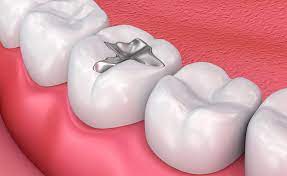Call: (630) 812-7929
How Long Do Dental Fillings Last? Tips For Prolonging Their Lifespan


Dental fillings are a common procedure to restore teeth damaged by decay or cavities. It’s natural to wonder how long dental fillings last and what can be done to prolong their lifespan. In this article, we will explore the factors that influence the longevity of dental fillings and provide valuable tips to help extend their durability. By following these suggestions, individuals can maximize the lifespan of their dental fillings and maintain optimal oral health.
Types Of Dental Fillings
The type of filling material used can significantly impact its longevity. Here are the most common types of dental fillings:
Amalgam Fillings:
Made of a mixture of metals, amalgam fillings are known for their durability and longevity. They can last for 10 to 15 years or even longer with proper care.
Composite Fillings:
These tooth-colored fillings blend seamlessly with the natural tooth, providing an aesthetically pleasing result. While composite fillings are not as durable as amalgam, they can last 5 to 10 years with good oral hygiene practices.
Ceramic Fillings:
Ceramic or porcelain fillings are highly resistant to staining and offer excellent durability. With proper care, they can last up to 15 years or more.
Factors Influencing The Lifespan Of Dental Fillings
Several factors can impact how long dental fillings last. These include:
Oral Hygiene:
Maintaining good oral hygiene is crucial for the longevity of dental fillings. Brushing twice a day, flossing daily, and using mouthwash can help prevent decay and preserve the integrity of the fillings.
Bite Force And Grinding:
Excessive bite force or teeth grinding (bruxism) can put additional stress on dental fillings, leading to premature wear and failure. If you grind your teeth, consider wearing a nightguard to protect your fillings while you sleep.
Diet And Habits:
Consuming sugary and acidic foods and beverages can increase the risk of tooth decay, compromising the integrity of dental fillings. Additionally, habits like nail-biting or chewing on hard objects can damage fillings. It’s best to avoid these habits to extend the lifespan of your dental fillings.
Regular Dental Check-ups:
Regular visits to your dentist are crucial for monitoring the condition of your fillings. Dentists can identify signs of wear or deterioration and address them before more significant problems arise.
Tips For Prolonging The Lifespan Of Dental Fillings
To maximize the lifespan of your dental fillings, consider the following tips:
Practice Good Oral Hygiene:
Brush your teeth twice daily with fluoride toothpaste, floss daily, and rinse with an antibacterial mouthwash. This routine helps prevent decay and maintains the health of your fillings.
Avoid Excessive Pressure:
Be mindful of your bite force, and avoid using your teeth to open packages or bite into hard objects. Wear a mouthguard for protection if you engage in sports or other activities that pose a risk of dental trauma.
Limit Sugary And Acidic Foods:
Reduce your intake of sugary and acidic foods and beverages, as they can erode tooth enamel and contribute to decay. Opt for healthier alternatives and rinse your mouth with water after consuming acidic foods or drinks.
Maintain Regular Dental Check-ups:
Visit your dentist for routine check-ups and professional cleanings. This allows for early detection of any issues with your fillings and ensures timely intervention.
The Bottom Line
The lifespan of dental fillings varies depending on factors such as the filling material used and individual oral hygiene practices. By following proper oral hygiene routines, being mindful of your bite force and eating habits, and scheduling regular dental check-ups, you can significantly extend the lifespan of your dental fillings




